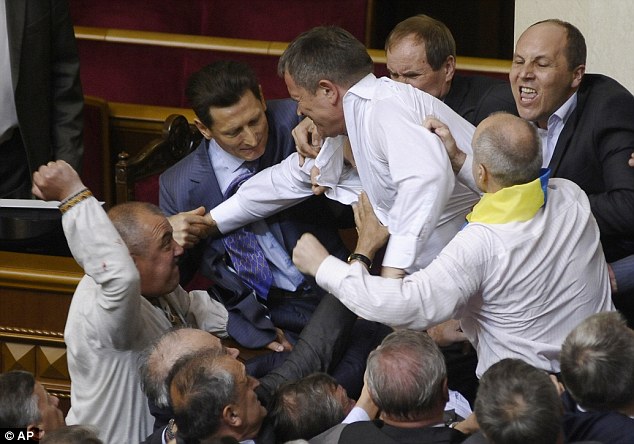
Party of Regions Plays Russian Language Trump Card Again
Publication: Eurasia Daily Monitor Volume: 9 Issue: 105
By:

Several Ukrainian people’s deputies had their faces bruised and their shirts torn in a fistfight in parliament on April 24. The opposition caucuses of Our Ukraine and former Prime Minister Yulia Tymoshenko’s bloc (BYT) provoked the brawl in order to disrupt voting on a controversial language bill, which the ruling Party of Regions (PRU) wanted to pass in order to increase its chances of victory in the parliamentary elections scheduled for October 28. The fighting forced the legislature’s speaker, Volodymyr Lytvyn, to close the session early. Yet, the PRU is as determined to push through its bill as the nationalist opposition is determined to prevent this. Both are actually concerned about mobilizing their electorates rather than about linguistic rights.
The PRU’s opponents were not shy about using non-parliamentary methods to derail the vote on the language bill. While one of them snatched the chair from under Lytvyn, another one broke his microphone (Ekonomicheskie Izvestia, May 28). Deputy Speaker Mykola Tomenko, who is from the BYT, said the opposition was ready to physically block the parliamentary rostrum for a month if needed so that President Viktor Yanukovych would be forced to legally disband the parliament (Channel 5, May 25).
According to the bill that was drafted by Vadym Kolesnychenko and Serhy Kivalov from the PRU, the native language of at least 10 percent of the population in every Ukrainian region will be given the status of a regional language. Under the new law, minorities would thus be able to use their languages in education and in dealing with the state. The PRU argues this is in line with the European Charter for Regional or Minority Languages and would bring the country closer to European standards of democracy. The opposition fears that the bill, if passed into law, will introduce de-facto Russian-Ukrainian bilingualism, said Volodymyr Yavorivsky from the BYT (Inter TV, May 24). Tymoshenko claimed from her prison cell that passing the law would be a “crime” (Ukrainska Pravda, May 24). The nationalists believe that neighboring Russia uses its language as a tool for domination and subjugation – hence their staunch opposition.
If the PRU takes the upper hand, Russian may become the regional language in 13 out of the country’s 25 regions, along with Hungarian in the Transcarpathian Region, Romanian in Chernivtsi Region and Crimean Tatar in Crimea (glavcom.ua, May 14). This may improve Ukraine’s relations with Hungary and Romania whose governments often claim that Ukraine does not respect its minorities. Yanukovych will also try to use the law to improve relations with Russia, spoiled by recent bilateral trade disputes and Moscow’s siding with the West to condemn Tymoshenko’s imprisonment (Zerkalo Nedeli, May 26). The head of the Russian Federal Agency for Commonwealth of Independent States (CIS) Countries and International Humanitarian Cooperation, Konstantin Kosachev, said the current situation in Ukraine – with the Russian language discriminated against – is “absolutely unacceptable,” and that Russia expected changes in this respect (UNIAN, May 26).
However, at least one large minority, the Crimean Tatars, traditionally allied with Ukrainian nationalists, is not happy about the PRU’s initiative. Their leader, Mustafa Dzhemilev, warned that the law would split the country in two. He also said that Crimean Tatars want their children to learn Ukrainian. But if Russian obtains an official status, they will have no incentive to do so (for-ua.com, May 28).
Russian is the preferred language for 35-37 percent of Ukrainian citizens, while 45-47 percent prefer Ukrainian, according to a recent survey by Research & Branding Group (Ukrainska Pravda, September 6, 2011). Another local pollster, the Kyiv International Institute of Sociology, found that 47 percent of Ukrainian citizens are in favor of giving some status to Russian, which currently has none under the constitution – Ukrainian is the country’s only official language (zn.ua, March 18, 2012). Nevertheless, Russian dominates the print media and the Internet while there is more Ukrainian on television, which is more strictly regulated by the state. Ukrainian also dominates in education, including in many Russian-speaking areas such as Kyiv.
Russophones make up the majority in eastern Ukraine, which is the PRU’s stronghold. For this reason, the PRU has used the Russian language card in all elections during the last decade. The party’s program calls for giving Russian the status of an official language on par with Ukrainian. However, this is impossible; it would require the backing of two-thirds of people’s deputies to pass such a constitutional amendment. The current PRU-dominated parliament lacks that level of support, as Kolesnychenko said in a recent interview (TVi, May 16). Furthermore, there are many opponents of bilingualism even within the PRU’s ranks, including Yanukovych’s key adviser on humanitarian issues, Hanna Herman.
Consequently, the PRU has instead chosen to support the law on regional languages, which can be passed by a simple majority. The law will not make Russian equal in status to Ukrainian but can make it the dominant language in half of the country while depriving Russian speakers of the incentive to learn Ukrainian. Both the PRU and the opposition agree that if the law is passed, the popularity of the PRU is likely to rise by about five percentage points – up from the current 16-20 percent (zn.ua, May 26; ICTV, May 28). The united opposition is currently running only two to four percentage points ahead of the PRU. Thus the language law may decide the election race, and the rival camps in parliament are unlikely to back down in their fight over this bill.




